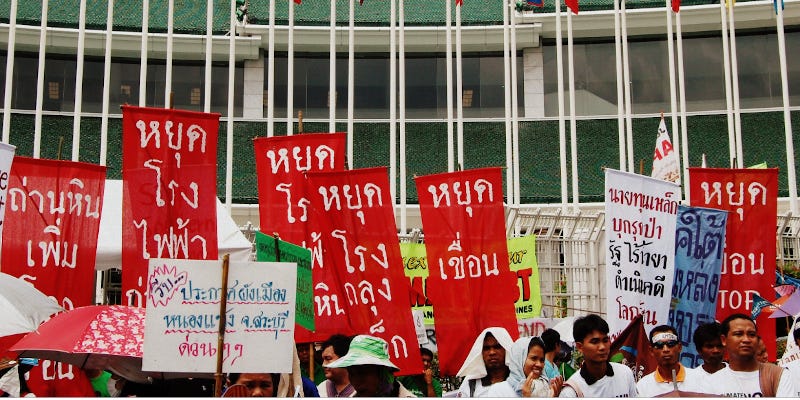REDD discussions in Bangkok
With only one more week of negotiations left until Copenhagen, what comes out of the Bangkok Climate Change Talks on REDD is important.
The Ecosystems Climate Alliance commented from Bangkok that, “This text will profoundly influence the shape of the final agreement, determining whether or not we will actually succeed in reducing the 25 percent of global greenhouse gas emissions that result from the continuing destruction of the world’s tropical forests and peatlands.” But so far things are not looking good for Indigenous Peoples and local communities, forests or for the climate.
The REDD discussions are taking place mainly in the Ad Hoc Working Group on Long-term Cooperative Action under the Convention (AWG-LCA). The basis for these discussions is the 2007 Bali Action Plan and the relevant part for REDD is Paragraph 1(b)(iii), which calls for “Policy approaches and positive incentives on issues relating to reducing emissions from deforestation and forest degradation in developing countries; and the role of conservation, sustainable management of forests and enhancement of forest carbon stocks in developing countries”. This is known as REDD-plus.
Each of the points highlighted in REDD-plus is potentially problematic:
“conservation” sounds good, but the history of the establishment of national parks includes large scale evictions and loss of rights for indigenous peoples and local communities.
“sustainable management of forests” could include subsidies to commercial logging operations in old-growth forests, indigenous peoples’ territory or in villagers’ community forests.
“enhancement of forest carbon stocks” could result in conversion of land (including forests) to industrial tree plantations, with serious implications for biodiversity, forests and local communities.
Because of these problems, the exact wording of the REDD text that comes out of the UN climate negotiations is extremely important.
FIELD (Foundation for International Environmental Law and Development) has produced two very useful briefing papers on the UN-level discussions about REDD-plus, available here.
In addition to the REDD discussions in the AWG-LCA, the Subsidiary Body for Scientific and Technological Advice (SBSTA) is discussing methodological issues related to REDD aiming to come up with a draft decision to be adopted by COP 15 in Copenhagen.
Other REDD-related discussions are taking place in the Ad Hoc Working Group on Further Commitments for Annex I Parties under the Kyoto Protocol (AWG-KP). AWG-KP’s main focus is on emissions reduction targets for “developed countries”. One question is whether these countries will be allowed to use REDD to meet their emissions targets. Discussions in the AWG-KP on Land use, Land-use Change and Forestry (LULUCF) could also have implications for REDD, through definitions for example.
On 3 October 2009, a REDD subgroup within the AWG-LCA produced a “non-paper”: Non-paper No. 11 03/10/09 @ 12.00. Several organisations immediately criticised this text. “We have to get REDD right if Copenhagen is going to succeed in reducing global emissions,” said Bill Barclay of Rainforest Action Network. “This language fails that test.” Barclay has a concrete suggestion for improving the text. “To restore the original intent of REDD, parties must add a clear definition of forests that does not allow for the conversion of rainforests and peatlands to plantations.”
Nils Hermann Ranum of Rainforest Foundation Norway pointed out that “There’s no wording assuring Indigenous rights. Rather, the proposals here undermine all the battles of Indigenous peoples for the respect of their rights and threaten all the rights guaranteed to them under existing international agreements.”
There is much talk of a “phased approach” in discussions about REDD. Unfortunately, it appears that this phased approach is also being taken with respect to safeguards, with suggestions that safeguards should only be applied when REDD is operational. This effectively undermines the whole point of the safeguards – they will kick in only once the damage has been done.
On 8 October 2009, the AWG-LCA subgroup produced a new “non-paper”: Non-paper No. 18∗ 08/10/09 @ 11:00. This is a further step backwards. The previous non-paper included the words: “Protect biological diversity, including safeguards against the conversion of natural forests to forest plantations.” This was in square brackets, meaning that it had not yet been agreed, but at least it was there. In the latest version, there is no mention of avoiding conversion of native forests to plantations.
Based on the current negotiating text, REDD will end up supporting business as usual. “The REDD process is doing precisely what it was created not to do,” said Dr. Rosalind Reeve of Global Witness. “It’s turning into the biggest subsidy ever for the logging industry and putting us on the road to forest destruction.”




Comments following the original post on REDD-Monitor.org are archived here: https://archive.ph/f7v2U#selection-757.4-757.14